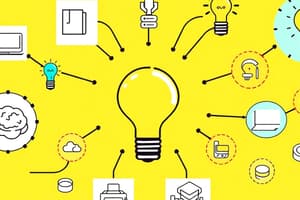Podcast
Questions and Answers
Which of the following criteria evaluates long-term sustainability of an idea?
Which of the following criteria evaluates long-term sustainability of an idea?
- Design thinking
- Desirability
- Feasibility
- Viability (correct)
What aspect of the Business Model Canvas directly deals with how a company will generate income?
What aspect of the Business Model Canvas directly deals with how a company will generate income?
- Channels
- Revenue streams (correct)
- Customer segments
- Cost structure
In the product life cycle, which phase follows the growth stage?
In the product life cycle, which phase follows the growth stage?
- Development
- Maturity (correct)
- Decline
- Introduction
Which customer segment is primarily responsible for making the purchase decisions?
Which customer segment is primarily responsible for making the purchase decisions?
Which of the following customer problems relates to constraints on financial resources?
Which of the following customer problems relates to constraints on financial resources?
Which of the following best defines the Serviceable Obtainable Market (SOM)?
Which of the following best defines the Serviceable Obtainable Market (SOM)?
What is a key benefit of developing customer journey maps?
What is a key benefit of developing customer journey maps?
Which type of revenue model focuses on direct sales to consumers?
Which type of revenue model focuses on direct sales to consumers?
What is the purpose of utilizing prototypes during entrepreneurial experimentation?
What is the purpose of utilizing prototypes during entrepreneurial experimentation?
What does the acronym TAM stand for in market analysis?
What does the acronym TAM stand for in market analysis?
In hypothesis testing, what is the first step to be taken?
In hypothesis testing, what is the first step to be taken?
What is the significance of market sizing for a business?
What is the significance of market sizing for a business?
Which approach is a form of experiential prototyping?
Which approach is a form of experiential prototyping?
Why is building a strong startup team beneficial?
Why is building a strong startup team beneficial?
What is the primary function of the 'Problem-Solution-Benefit' framework?
What is the primary function of the 'Problem-Solution-Benefit' framework?
Flashcards
Viability
Viability
How sustainable an idea is in the long term.
Customer problems
Customer problems
Obstacles customers face, like lack of time, money, skills, or access.
Business Model Canvas
Business Model Canvas
A tool to outline a business, focusing on key elements like partners, activities, and resources.
Product life cycle
Product life cycle
Signup and view all the flashcards
Customer segmentation
Customer segmentation
Signup and view all the flashcards
Customer Persona
Customer Persona
Signup and view all the flashcards
TAM (Total Addressable Market)
TAM (Total Addressable Market)
Signup and view all the flashcards
SAM (Serviceable Addressable Market)
SAM (Serviceable Addressable Market)
Signup and view all the flashcards
SOM (Serviceable Obtainable Market)
SOM (Serviceable Obtainable Market)
Signup and view all the flashcards
Customer Journey Map
Customer Journey Map
Signup and view all the flashcards
Experimentation (Entrepreneurial)
Experimentation (Entrepreneurial)
Signup and view all the flashcards
Prototype
Prototype
Signup and view all the flashcards
Revenue Model
Revenue Model
Signup and view all the flashcards
Unit Sales Revenue Model
Unit Sales Revenue Model
Signup and view all the flashcards
Hypothesis Testing
Hypothesis Testing
Signup and view all the flashcards
Study Notes
Criteria for a Successful Idea
- Feasibility: What can be achieved in the near future
- Viability: How sustainable the idea is long-term
- Desirability: Who will want the product or service?
- Design thinking: A process to solve complex problems, navigate uncertainty, and create something new.
Customer Problems
- Lack of time
- Lack of money
- Lack of skills
- Lack of access
Business Model Canvas
- Key partners: Important partnerships
- Key activities: Crucial business activities
- Key resources: Essential resources
- Cost structure: Costs involved
- Revenue streams: Ways to generate income
- Channels: Methods to reach customers
- Customer relationships: How to engage with customers
- Value propositions: What value the business offers
Product Life Cycle
- Stages: Low intro, growing growth, peak maturity, declining decline (graph needed)
Types of Customers
- Users: Directly interact with product/service
- Influencers/Recommenders: Shape others' decisions
- Economic buyers: Concerned with cost and value
- Decision-makers: Authorize purchases
Customer Segmentation
- Identify who customers are
- Understand their location
- Determine how they buy
- Analyze their behavior
- Recognize their needs
Customer Personas
- Profiles of ideal customers
- Demographics: Age, gender, location, etc.
- Psychographics: Personality, values, interests, etc.
- Proxy product: An alternative that gives information about consumer needs
- Day in the life: Insight into customer routine
- Biggest fears/motivators: Understanding customer concerns and motivations
- Challenges and pain points: Problems customers face
Customer Journey Maps
- Five stages: Awareness, consideration, decision, service, loyalty (chart needed)
- Visual representation of customer experience
- Develop empathy for the customer
- Holistic view of the customer experience
Market Sizing
- TAM (Total Addressable Market): Entire potential market
- SAM (Serviceable Addressable Market): Market you can reach and serve
- SOM (Serviceable Obtainable Market): Portion of SAM you can capture
- Identifies growth opportunities
- Calculates sales and profits
- Pinpoints competitive threats
- Considering exit strategies
- Understanding market trends
- Proof for investors
Experimentation
- Generate new ideas: Try new experiences, work in multiple industries, develop new skills, disassemble products/processes/ideas.
- Test ideas: Build prototypes, pilot new processes, launch ventures in the market.
Hypothesis Testing and the Scientific Method
- Ask questions
- Background research
- Hypothesize
- Experiment
- Analyze data
- Access results
Entrepreneurial Experimentation
- Acting to learn
- Experimenting quickly to refine ideas
Prototypes
- MVP (Minimum Viable Product): Basic version
- Rapid Prototypes: Quick, low-fidelity versions
- Mock-up Prototypes: Flat designs
- High-Fidelity Prototypes: Detailed versions
- Lego Prototypes: A specific form
- Role playing/Experiential Prototypes: Engaging customers
- Wizard of Oz Prototypes: Simulate functions using a hidden element
- User-driven Prototypes: Based on user input
Piloting and Prototyping
- Storyboards: Initial concept representation; sequences of sketches, drawings, illustrations
- Customer Interviews: Crucial feedback
- Feedback Interviews: Gather insights and improvements based on experience
- Determine usability, identify areas for improvement, learn what to improve
The Value of Networks
- Access to private information
- Access to diverse skillsets
- Access to power
Value of a Startup Team
- Feedback
- Extended network
- Increased skill set
- Capacity for innovation
- Higher social level of support
- Moral support
Revenue Models
- Unit Sales Revenue Model: Income from items sold
- Retail business model
- Includes physical and digital products
- "Razor and razor-blade" model
- Advertising Revenue Model: Income from ads
- Digital/traditional ads
- Data Revenue Model: Income from data sales
Retail-Wholesale Pricing
- Cost of Good Sold (COGS)
- Gross Profit margin calculation (Gross Profit / Revenue)
Studying That Suits You
Use AI to generate personalized quizzes and flashcards to suit your learning preferences.




